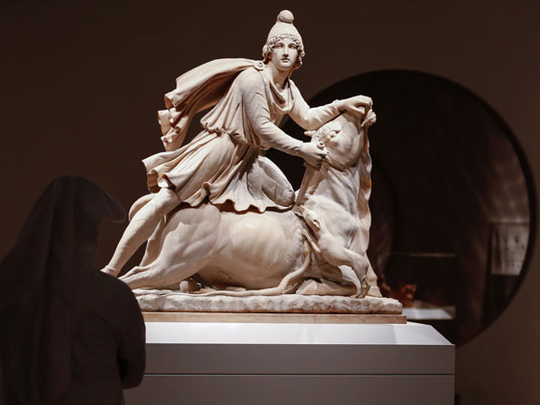
Abu Dhabi: Around two million years of history will be open for up-close viewing during the History of the World in 100 Objects exhibition that will open its doors to the public on Wednesday.
Showcasing some of the themes that will be seen at the 2016 Zayed National Museum, the exhibition features items primarily from the Middle East, with the oldest being 1.7 million years old. Running for 100 days, until August 1, the Saadiyat Cultural District event borrows a range of historic items from the British Museum.
“Navigating an unparalleled collection of historic objects that provides visitors with an opportunity to learn more about where we came from and ultimately who we are, the exhibition places the cultural significance of the UAE and the Arab World in general within the context of human history,” Salama Al Shamsi, Project Manager of the Zayed National Museum said.
In addition to artefacts, and other rare items that were pivotal to enshaping human history, such as examples of early writing on clay dating back to 3100 to 3000 BCE, the exhibit also reveals modern-day items that have greatly contributed to our development.
“For example, the Japanese Jomon pots, which were made of leakproof clay, allowed the Jomon people to eat a varied diet. This is because they learnt how to cook food to make stew and similar meals that they couldn’t previously prepare using older vessels,” said Becky Allen, the British Museum’s Curator of the exhibition.
Certain objects had to be handled by historians and other experts for the extent of their cultural sensitivity.
“For the Japanese Samurai blade dating back to 1200-1250 CE, we had to bring a Japanese sword expert who trained some of our staff on how to handle and display the item. This is why it is not placed on the bottom of the display-case like many of the other artefacts,” Becky added.
Other relics include the Yemeni bronze hand, that is considered a personal item because it was based on the hand of an actual person from the hill town of Riyam.
The idea for the show was inspired by a 2010 radio series that aimed to tell a story of human history using on 100 artefacts, and was organised by the Tourism and Culture Authority (TCA-AD) in collaboration with the British Museum.












